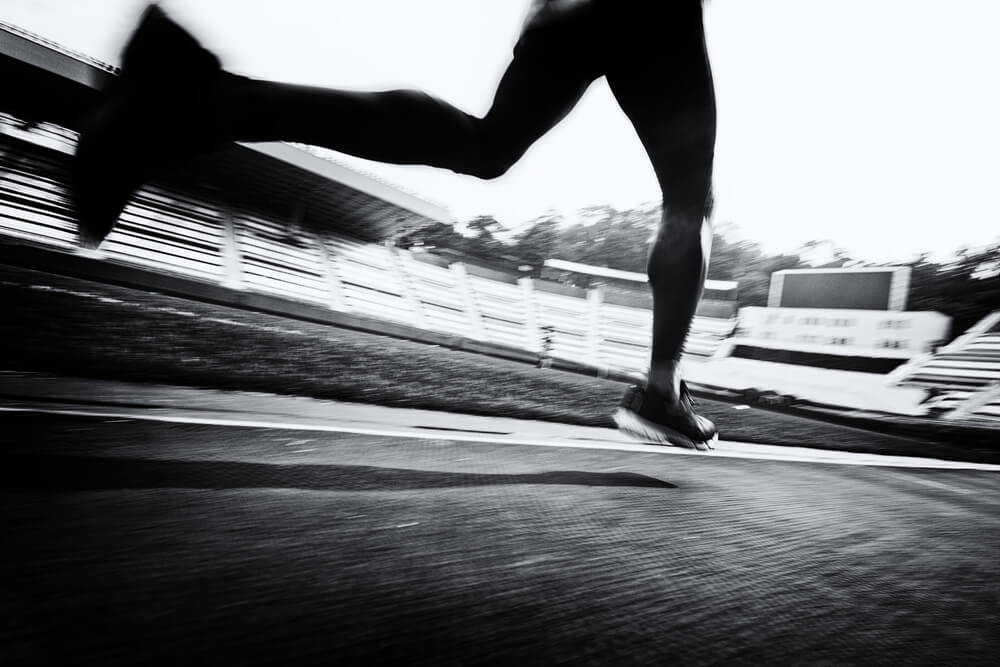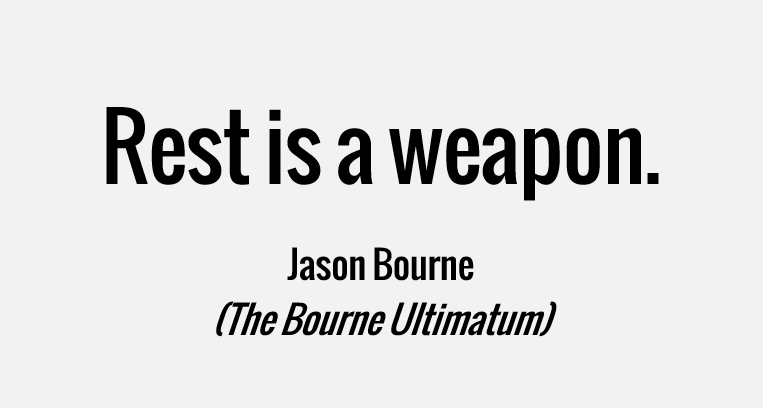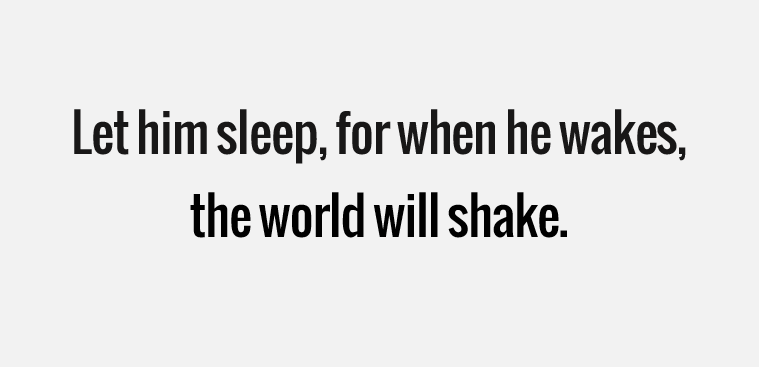“Rest is a weapon,” said superspy Jason Bourne in Robert Ludlum’s The Bourne Ultimatum. He may very well have been describing the benefits of sleep to high performance athletes, as professional sports teams and top caliber athletes are now realizing. Here is your guide to finally getting the sleep you need between the sheets.

“Come on,” I growled at the red digits of the alarm clock.
As the clock rolled over 4am, so did I for what was the possibly the hundredth time that evening. I sighed heavily, untangled the sheets from my legs, and stared at the hotel room ceiling. I grew more frustrated counting down how many hours of sleep I could get if I fell asleep that very instant. Not enough, I told myself.
The biggest race of my life was the following morning. Physically I was tapered and as physically ready to go as possible. My brain, however, simply refused to power down.
I had also slept poorly the night before. The exhaustion from that night of bad sleep made me feel worse for not dozing off.
I am tired. Why aren’t I sleeping?
I’d gotten up and eaten. Walked around. Read for a while. Fired up a video on YouTube of a hypnotist who promised to cure insomnia in 5 minutes or less. Tried every sleeping position in the repertoire. None of it had worked.
After eventually dozing off, and getting a couple hours of much-needed sleep, I spent the next day in a grumpy, foggy haze.
And yet, when it came to race time, I performed well.
Surprisingly well, as it turned out.
Despite this, I couldn’t help but feel that I could have performed better if only I had had a decent night of rest under my belt.
Here is what I would have done differently.

The Power of Good Sleep Habits
When it comes to creating high performance athletes, there are three things that have to be considered: training, nutrition, and rest & recovery.
Only recently have coaches and athletes started paying more attention to the sleep aspect of training in order to get that tactical edge over the competition. Professional sports teams now employ “sleep doctors” to help mitigate fatigue during long road trips and travel.
And as we are learning, the gains that can be pulled from sleeping properly are staggering.
How Sleep Deprivation Affects Athletic Performance
We’ve all had those workouts where we showed up, exhausted after a brutal night of sleep, and still managed to throw down a killer session. As a result, we consider sleep over-rated; after all, if we could perform that well on little rest, then what’s the big deal, right?
In the short term performance isn’t (usually) affected by a crappy night of sleep. One night of bad rest doesn’t mean you are going to have an awful workout tomorrow. Which should help calm some of that anxiety you may have when facing a difficult night of sleep.
Here is what the research has to say happens when athletes subject themselves to sleep deprivation:
- A group of collegiate weight lifters, after staying up for 24 hours, showed no drop in performance when it came to doing the snatch, squat, and clean and jerk compared to their non-sleep deprived totals. General fatigue, lack of vigor and increased confusion were all experienced by the lifters as a result of the sleepiness incurred.
- Another group of collegiate male team-sport athletes found reduced performance in both sprint and intermittent running after 30 hours of sleep deprivation. Their moods were also negatively affected.
- When eight competitive swimmers were subjected to partial sleep deprivation (2.5 hours per night over 4 nights), back and grip strength, as well as sprint swimming performance, were unchanged. There was, as you can guess, some serious fatigue, tension, and even depression [1].
- For athletes who rely on their speed and reaction times going a night without sleep can be a game changer. And not in a good way, as reaction times increased by over 300% in one study. After only 17-19 hours of sleep deprivation reaction times of participants were the equivalent or worse than having 4-5 drinks (or a blood alcohol level of 0.05%).
- Research on Major League Baseball players showed sleepiness was directly correlated with career longevity. Better the sleeper, the longer the career.
- Athletes who get less than 6 hours of sleep per night are also more likely to get injured, as this study and this study. Under-recovery, a compromised immune system and general fatigue were the main culprits.
- On the other hand, when Stanford’s basketball players and swimmers were instructed to extend their sleep to 9-10 hours per night for a period of approximately 6 weeks, performance skyrocketed. Reaction time, sprint speed and accuracy improved significantly across both sports.
To sum up the findings of this research, very short, maximum exertion efforts are affected least when it comes to sleep deprivation. But if you need to do repeated sets, or your performance is aerobically-based, there will be some struggles.
And to top it off, going beyond the recommended “8 hours” appears to have significant improvement on performance.
The Outlier. In my research for this article I came back to a piece published by the Australian Institute of Sport. A group of elite water polo players were asked to do an 8×50 meter swim time trial, and then swim the length of the pool and shoot at a specific target three times. They performed both fully rested and then again after staying awake for 24 hours. They swam faster and were more accurate after being awake for 24 hours. Go figure.

Sleep Deprivation in Competition
While this won’t surprise most seasoned athletes, a full 64% of athletes surveyed in an Australian study reported recently having difficulty sleeping the night before an important competition.
Nervous thoughts about the competition at hand was the most cited reason for poor sleep. In addition, 32% of individual athletes and 59% of team athletes didn’t have a strategy in place for getting a good night’s rest.
The anxious thinking about the meet or competition and the new surroundings (hotel bed, sharing a room with a teammate, travel, etc.) create a perfect storm of sorts where an athlete has a hard time getting the sleep he or she wants.
To further complicate things, how well we end up performing depends on our chronotype—whether we are a night owl or a lark (a.k.a. Daywalker). A study of competitive field hockey and squash players found each athlete had a unique pattern of peak performance, with their best and worst results occurring at different times of the day.
The night owl (meekly raises hand) in particular fared the worst in the mornings, performing a painful 26% below their best result.
How to Get Some High Performance Sleep
With an understanding of how critical sleep is, and how many roles in can play in terms of performance and health, here are a list of 15 things that you can begin to implement immediately in order to improve your sleeping habits.
1. Have a regular sleep schedule. Your training schedule should be fairly regular, yes? And so should your sleeping habits. Granted, there will be nights where you need more or less sleep depending on the intensity of your training, but by and large, try to hit the same bedtime regularly.
2. Don’t work or hang out in your bed. Your bed for should be for two things, sleeping and hanky-panky. Things like watching television, writing a paper, and endless text conversations all only serve to keep your brain awake. Draw a clear connection between sleep and your bed.
3. Ditch the screens. You know that using your phone in bed is a bad move when it comes to getting quality sleep. And yet, we all do it anyway. When you bring your electronics into bed and stare into the blue-glow of the screen you are sending your body mixed signals. The artificial light also reduces melatonin production, making it harder for you to doze off.
4. Nap if you can. Once I graduated high school the thing I was possibly most excited about was that I could take a nap between morning and afternoon workouts. As it turns out, napping can have a positive effect on your performance, especially if you are coming off of a night of crappy sleep. Research shows that alertness, short-term memory and sprint times all improved after a 30-minute nap following a night with 4 hours of sleep. Guilt-free naps? Yes, please.
5. Have a pre-bed routine. Have a power-down routine each evening before bed. From an hour or half hour out from when you want to be asleep plot out the things you will do each evening before zonking out. Brush teeth. Read for twenty minutes. Prep clothes for the following day. Write in your journal. And so on. Doing this regularly will draw a clear connection in your mind and prime your body for a proper night’s rest. This will come especially handy when you are traveling and sleeping in a new environment. The routine will give you a sense of familiarity in the foreign.
6. Stop hitting the snooze button. It’s tempting to think that using the snooze button like a welcome mat to slowly waking up is beneficial. But what happens is that each time you hit snooze your body lapses back into a fresh sleep cycle. The second time the dreaded alarm goes off you are further down the rabbit hole of sleep, which is why you usually feel worse and drowsier than the first time your alarm went off, sending you into a type of sleep inertia that can last up to 2-4 hours.
7. Avoid caffeinated beverages before bed. Caffeine is a popular stimulant used by many athletes in order to increase alertness and focus, and also combat drowsiness and sleep deprivation. Which is why you should definitely not ingest any of it near bed time. Caffeine has been shown to increase wakefulness, shorten slow wave sleep, rapid eye movement and overall sleep time. Seems like another obvious one, but pre-workout, coffee, and other sources of caffeine should be avoided before sleepy time.
8. Still can’t sleep? Get out of bed. If you are still having trouble sleeping, get out of bed. This might seem counter intuitive, research has shown that the longer you thrash around the sheets, getting progressively more frustrated and angry, you deepen the association of bed = crappy sleep, perpetuating the insomnia. Go into the next room and do some reading, listen to some chill music—any kind of low level activity.
9. Make your bedroom a Batcave. It doesn’t take much light to start screwing with your melatonin and serotonin production, so go full stealth mode in the bedroom. This means black-out curtains for pesky street lights, turning off all the lights, closing doors, and powering off your cell phone completely (or do one better—leave it in the other room).
10. Keep your bedroom cool. I have a hard time sleeping during the summer. My house gets the early morning sun, warming up the bedroom to the point that I get up long before my alarm clock ever goes off. The best temperature for sleep? Aim for somewhere in the 15-20 degrees Celsius range (60-68 degrees Fahrenheit). Using a fan in the bedroom can help keep you cool and also blanket street noise.
11. Wake up at the same time every day. Going to bed at the same time every night is difficult as our sleep requirements vary from day to day. Which means there will be nights we pass out as planned, and others where we are still fresh and awake at our designated bed time. But if we are getting up at the same time every day our bodies will gradually tell us when it is time for night-night time in the evenings.
12. Take a hot bath or shower before bed. Similar to the point of keeping your bedroom nice and cool, taking a hot bath or shower and then experiencing the drop in body temperature once you get out initiates a slowdown in metabolic functions such as breathing, heart rate, and digestion, all signals that it’s time to pass out. The warm water has a side-benefit of dilating blood vessels and releasing muscle tension, which gives you that warm, relaxed feeling that is a perfect transition to the sheets.
De-Stress & De-Clutter Your Brain
For the final three tips we are going to get into the mental side of sleep.
High performance athletes aren’t immune to stress. Quite the opposite actually. On top of the day to day stresses that inflict the modern man and woman, they also have to deal with the anxieties that come with training and competition.
Outside of creating an environment that supports better sleeping habits, here are a few ways to quiet the voices in your head at night so that you can catch some sleep before morning practice or tomorrow’s competition:
13. Write out a short gratitude list each night before bed. Simple acts of gratitude have a wide range of positive effects, including on interpersonal relationships and emotional health. Researchers found that participants who kept a nightly gratitude journal, listing out a handful of things they were grateful for, reported better and more refreshing sleeps. Being grateful makes sense, as it leads you to thinking more positive thoughts, which another study also found to help sleep come more easily.
14. Write out whatever it is that is stressing you out. I cannot count how many times I have gone to bed and ended up tossing and turning for hours because something is stressing me out. The hopelessness of the situation, or the frustration I am feeling, all combine to guarantee that I get a fitful night of sleep. To combat this head back to the pad and pen and write out what is causing you the angst, and what you are going to do about it in the future. This seemingly benign act of putting pen to paper gives you a sense of relief that the situation—whatever it is—is being dealt with.
15. Write out your goals for tomorrow. This little list helps you organize your thoughts so that they aren’t running amok, keeping you awake. Our brain has an affinity for order, so encourage this feeling by writing out the top 3 things you want to accomplish the following day. Simple, but ordering your thoughts and “to do” list will calm the rambunctious mind.
Putting It All Together
Some key things to remember:
- The amount of sleep you will require on a daily basis will vary from day-to-day. If you are in the middle of a particularly brutal phase of training with two-a-days you will need more sleep than if you were banging out “only” one session a day. Seems obvious, but you’d be surprised how many athletes go for the 8-hour quota regardless of how hard they are training.
- Sleep is when your body is recovering and repairing itself. Athletes go from performing their butts off in the gym, on the court, and in the pool, to doing everything they can between sessions in order to repair and restore themselves so that they can come back and take another swing at a massive workout. The time you spend in the sheets is where you do a bulk of your recovery. It’s critical to your success as an athlete to make the most of it.
- Keep trying different things until you land on what works best. It’s easy to read some of these suggestions and dismiss them outright because they appear too simple. Pick and choose a few of the tips, try them out, and make sleep your ally in your battle to achieve monstrous results. Keeping a sleep diary, or at the very least recording your sleep patterns in your workout journal, can help you draw connections between what works and what doesn’t.
[1] Sinnerton S, Reilly T. Effects of sleep loss and time of day in swimmers. In: MacLaren D, Reilly T, Lees A, eds. Biomechanics and Medicine in Swimming VI. E. and F.N. Spon, London: 1992, pp. 399-405.
More:
- Why You Should Be Working Out First Thing in the Morning. There are a host of benefits to structuring your mornings around your workouts. Here are just a few of them.
- The Only Supplement You Truly Need. More reading on the importance of sleep and the benefits of sleep extension as evidenced by research by Dr. Cindy Mah at Stanford.